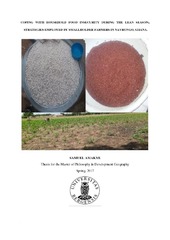Coping with household food insecurity during the lean season; strategies employed by smallholder farmers in Navrongo, Ghana
Master thesis
Permanent lenke
https://hdl.handle.net/1956/16031Utgivelsesdato
2017-06-21Metadata
Vis full innførselSamlinger
- Department of Geography [634]
Sammendrag
In Ghana, smallholder farmer households are the most dominant food producers. Yet, they are the most vulnerable to of food insecurity. Seasonal food production, climate change, coupled with other social factors further worsens the state of food insecurity among households. This study examines the food insecurity situation among smallholder farmer households and how households as a unit cope with during the lean season. The lean season in this context refer to the period between planting and just before harvesting. It is the time when most households’ food stock reaches its minimum level. Food prices during this time also increase. With low purchasing power, farmers’ households find it difficult to access foodstuff from the market to meet their consumption demands. Nevertheless, households’ find a way to manoeuvre through such period. The study makes use of qualitative research techniques, thus, interviews, participant observation, photo elicitation, case study and informal conversation for data production. The study drew insight from the concept of food security, entitlement approach and the sustainable livelihood approach as a framework. The study found that most households experience food insecurity during the lean season. This is caused by many related factors ranging from the environment to anthropogenic. The study also found that different coping strategies, classified as food-based and non-food based strategies are employed as an immediate response to food insecurity. Further, the study revealed that the type of coping strategy use by households heavily depends on the resource entitlement available to the household.
